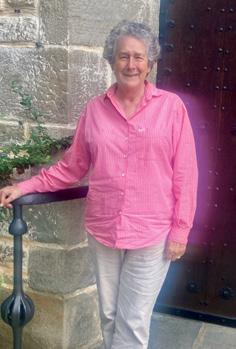
4 minute read
For Trinity’s Betsy Crenshaw, It’s a Privilege
For Trinity’s Betsy Crenshaw, It’s a Privilege
By Leonard Shapiro
Betsy Crenshaw, the long-time administrative assistant at Trinity Church in Upperville, grew up in Trenton, New Jersey, the daughter of a banker who once offered her sage advice when she told him she really wanted to be a farmer, a calling no-one in her family had ever aspired to.

“He said that if I wanted to be poor and dirty my whole life, then do it,” she said. “And if this is really your passion, let’s get you educated to be a farmer.”
Crenshaw needed no further convincing. She became the first woman to graduate from what was then called Delaware Valley College of Science and Agriculture, now a fully-accredited university. And farming partly remains a way of her life to this day, what with a herd of over 100 Angus cows she and her husband Jerry still own.
“For someone like me, who had no experience at all, Delaware Valley was a great experience,” she said. “The school was so focused on practical application, and you had to get a job on a farm every year. College taught me how to drive a tractor, shear a sheep, trim apple trees.”
None of those skills come into play in her wide variety of responsibilities at Trinity, where she’s worked since 1990. She literally does it all, from helping to organize weddings, baptisms, funerals and social events to being a major force in the church’s annual fundraising Stable Tour to dealing with parishioners, staff members and visitors on a daily basis.
Rector Jonathan Adams offered another unofficial role Crenshaw occupies at Trinity.
“Betsy is the church historian,” he said. “I’m going to keep her on retainer once she retires. She has an amazing memory, and she knows everyone.”
Crenshaw’s journey to her first job at the Upperville church 34 years ago took some intriguing twists and turns, including one vital veer thanks to a very important Christmas card. She and Jerry met and married when they were working at a 7,000acre farm in Rock Falls, Illinois, a situation she said, “turned into a nightmare” when the farm’s owner went bankrupt and eventually went to jail for bank fraud.
Crenshaw sent that Christmas card to a friend in upstate New York and asked if he knew anyone looking for farm employees. That friend had another friend who lived in Upperville and was seeking some help. That turned out to be the late Tom Stokes, a long-time area resident with his now late wife, Mary, the owners of Ayrshire Farm.
“We had instant chemistry with Tom and Mary, and I think it went the other way as well,” Crenshaw said. “We brought our cows with us and they let us keep them at Ayrshire. Jerry was the farm manager and I was the farm secretary. We drove two Ryder trucks from Illinois to Virginia and I was so excited. When we got there, Tom Stokes came out the door and said, ‘welcome to the promised land.’”
As Crenshaw told that story, she teared up at the memory. At the time, she and Jerry had three-year-old Libby and six-year-old Ryan, and Libby was soon enrolled in the Piedmont Child Care Center, then operating out of Trinity and now across the street.
Crenshaw became friends with the center’s director, Alice Duggan, who hired her as a part-time office manager. She did a half day there and the other half at the farm for several years, until she was asked if she had any interest in working for the church.
“I said sure,” Crenshaw recalled. “I did a half day at both places for 15 years, and that was really fun. It was like I had 50 grandchildren over there. And now I’m on their (Child Care Center) board, so I’m still involved.”
When Ayrshire was sold in 1996, she and Jerry began working at Trappe Hill Farm in Upperville owned by the late Bruce Smart, whose wife, Edie Smart, survives him. Jerry was the farm manager, she handled the office for what she described as “16 wonderful years.”
“I love it,” she said. “It truly is a privilege to work here and to serve members of this community. It’s a privilege to be with folks when they’re getting married, being baptized, even funerals. It’s just a privilege to be in people’s lives and to help them when they need it the most.”










